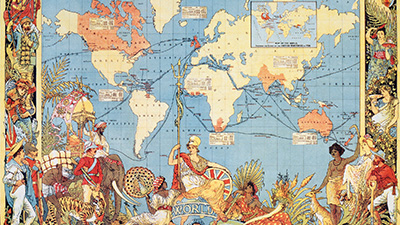Consequences of Industrialization
Driving Question: How did industrialization shape the motives and methods of imperial expansion in the nineteenth century?
This lesson will reintroduce the concept of empire against the backdrop of other trends in the nineteenth century. You will be presented with various connections between this new age of imperialism and the rise of nationalism, industrialization, and reform.
Learning Objectives:
- Identify how industrialization led to a resurgence of imperialism and the expansion of empires.
- Learn about the differences between imperialism and colonialism.
- Use close reading skills to consider how various trends contributed to a new age of imperialism.
- Create arguments using historical evidence to support claims and communicate conclusions through informal writing.
Vocab Terms:
- administrator
- colonialism
- exploitation
- formal colonialism
- imperialism
- racial superiority
Opener: Consequences of Industrialization
To teach this lesson step, refer to page 3 of the Lesson 6.0 Teaching Guide.
Historical causation is key to understanding how the past has unfolded. Read more in our Causation One-Pager.
Industrialization shaped the world in numerous ways. Make a prediction about these impacts by matching causes with their effects.
Unit 6 Overview
To teach this lesson step, refer to page 3 of the Lesson 6.0 Teaching Guide.
How did industrialization affect different people in different ways? Explore the uneven impacts of industrialization, particularly how it worked to bring lives and wealth and ease to some, and exploitation and oppression to others.
-
Guiding Questions
-
Before you watch
Preview the questions below, and then review the transcript.
While you watch
Look for answers to these questions:
- Why did demand for rubber increase in the nineteenth century and what region was one of the largest producers of rubber at this time?
- What was the new imperialism?
- How did industrialization provide the tools and motivation for the expansion of empires?
- How did the new imperialism change social interactions and organization?
- When and why did King Leopold of Belgium seek control of the Congo Free State?
- How did reformers such as George Washington Williams and E.D. Morel publicize the atrocities that were taking place in King Leopold’s Congo Free State?
- How did King Leopold’s abusive reign over the Congo Free State come to an end?
After you watch
Respond to the following question: How was this era of new imperialism similar to and different from earlier eras of imperial expansion?
Key Ideas
Unit 6 Introduction: Empire and Other Consequences of Industrialization, 1750–1900 CE
To teach this lesson step, refer to page 4 of the Lesson 6.0 Teaching Guide.
Although related, imperialism and colonialism are not the same—but what differentiates them?
-
Guiding Questions
-
Before you read
Preview the questions below, and then skim the article. Be sure to look at the section headings and any images.
While you read
Look for answers to these questions:
- How are imperialism and colonialism different?
- What were some ways that ideas from the previous unit helped drive imperial expansion?
- How did industrialization help empires expand?
- What were some strategies of resistance used by colonized peoples?
After you read
Respond to the following questions:
- Make two lists, one for colonized peoples and one for the citizens of imperial countries with vast overseas empires, such as the the United Kingdom and France. For each list, provide one impact of the new industrial imperialism on cultural interactions, governance, and economic systems.
- The author mentions that several of the revolutionary ideas you encountered in the last unit were used to support imperialism. How do you think liberal political ideas—like democracy or nationalism—could have been used as justifications for controlling people in colonies?
Closer: Consequences of Industrialization
To teach this lesson step, refer to page 6 of the Lesson 6.0 Teaching Guide.
Looking for ways to incorporate themes into your teaching? Check out these strategies in the Community Forum.
What themes will be featured in this unit? Evaluate the statements and try your best to figure it out!



